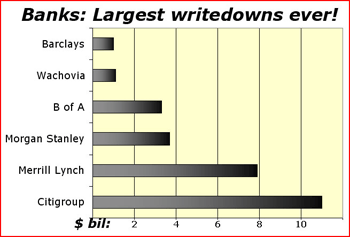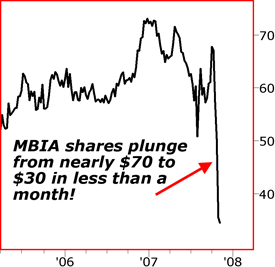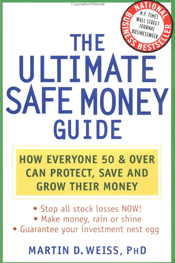Next Phase of the Financial Markets Credit Crunch Crisis: The Great Ratings Debacle
Stock-Markets / Credit Crunch Nov 12, 2007 - 11:58 AM GMT  Martin Weiss and Mike Larson write: Evidence of an imminent U.S. recession is now piling up so high, even Fed Chairman Ben Bernanke had to admit to a slowdown in his testimony to Congress last week …
Martin Weiss and Mike Larson write: Evidence of an imminent U.S. recession is now piling up so high, even Fed Chairman Ben Bernanke had to admit to a slowdown in his testimony to Congress last week …
The housing crisis is gutting the home equity of millions of households, abruptly ending their ability to use it as a personal ATM machine.
Big retail chains are expecting a holiday shopping season that one leading analyst calls "a train wreck under the Christmas tree."
Detroit is in shambles, with GM's $39 billion loss the biggest in the auto industry's history.
Even technology companies — thought to be a place for investors to hide from the fall-out of the housing crisis — are getting smacked, as evidenced by the rout in their shares last week.
And most important …
The credit crunch has spread to the nation's banks with the force of an F5 tornado. It's tearing into the banks' portfolios. And it's triggering their most intense tightening of lending standards in nearly two decades.
According to yesterday's New York Times,
Debt market conditions are rapidly deteriorating, leading some analysts to declare them worse than nearly a decade ago, when the Long-Term Capital Management hedge fund collapsed. Investors' appetite for pools of assets — from mortgages to auto and credit card loans — has all but dried up. And virtually all structured investment vehicles, commonly call SIVs, are trying to unload the securities they hold.
Meanwhile, word leaked out on Friday that three major banks — Citigroup, JPMorgan Chase and Bank of America — may be near a deal to create a $75 billion superfund to help stabilize credit markets.
But it won't end the crisis. Even Treasury Secretary Henry Paulson said on Thursday that the fund would not rescue troubled institutions; it would only lead to a longer and more orderly demise.
Clearly, the long-overdue day of reckoning that Mike and I have been warning you about is here. And clearly, the time has come to prepare for the next likely phase of the crisis:
The Collapse of the Great Ratings Scam
Right now, tens of thousands of ratings are issued for virtually every major bond, loan and debt in America. They're the brains and nervous system of our nation's entire credit markets. And the credit markets, in turn, are larger than all of our stock markets combined.
So when the integrity of these ratings is compromised, credit market pandemonium could be the result.
And, unfortunately, that's precisely the situation we're facing today. But it didn't happen overnight. It's the consequence of …
Four Long-Standing Deceptions by the Nation's Most Prominent Rating Agencies
We're talking about Fitch , Moody's and S&P . And their deceptions, when fully exposed, could emerge as the next major threat to the economy:
Deception #1. Payola in the Ratings Business
Virtually all ratings are bought and paid for by the very companies that are being rated — and as that money flows into the coffers of the rating agencies, it can corrupt the ratings process from start to finish:
• The rated companies are empowered to shop around for the most liberal ratings.
• They get sneak previews of the ratings before they're published.
• They can appeal downgrades and delay their publication. (They never appeal or delay an upgrade, of course!)
• And ultimately, they can fire the rating agency, taking their business elsewhere.
Look. If a disk jockey accepted just a few bucks from Sony, EMI, Universal or Warner, they'd call it payola and he could be carted off to jail. But when the Wall Street rating agencies take tens of thousands of dollars from companies like MBIA or GMAC for every rating they issue, that's supposed to be OK?
Or consider this: If reporters at Consumer Reports accepted so much as a stale sandwich from the companies they review, they could be fired on the spot. But when analysts at the big Wall Street rating agencies are wined and dined by their favorite companies, that's supposed to be OK, too?
No, it's not OK. It raises serious questions about objectivity, makes investors like you potentially vulnerable to losses and, as we'll explain shortly, can cause irreparable harm to our financial system.
Deception #2. Highly Inflated CDO Ratings
The rating agencies have issued dubious, highly inflated ratings on hundreds of billions of dollars in securities backed by mortgages and other types of credit — the so-called "collaterized debt obligations," or CDOs.
Why dubious and highly inflated?
Because financial ratings must be based on true value. And that value must be measured by actual market prices. The ratings on these CDOs, however, do neither. They were issued on artificially created securities that rarely had liquid markets, rarely had firm price bids, and never could be properly valued.
Moreover, instead of following standard practice — to haircut the securities because of their poor liquidity — the rating agencies did precisely the opposite: They gave these new-fangled bonds top-notch, "safe" ratings.
They even collected extra "consulting fees" to help create these securities in the first place. All predicated on their own hyped-up ratings! All based on their own theoretical models of their estimated value!
Now, it's widely recognized that the values were a fiction, and so were the ratings. That's why, as the Times reported yesterday, investors are dumping mortgaged-backed securities and other CDOs like there's no tomorrow. And that's why you're seeing such a bloodbath on Wall Street.
Indeed, in recent weeks, the selling panic has been coming so fast and in such large quantities, even preliminary estimates of losses are triggering some of the biggest writedowns of all time:

Citigroup — $11 billion; Merrill Lynch — $7.9 billion; Morgan Stanley — $3.7 billion; Bank of America — $3.3 billion; Barclays and Wachovia — $1 billion each …
Plus, much, much more to come.
Deception #3. "Triple-A" Bond Default Insurance
The big three rating agencies have forever issued stellar, triple-A ratings to four specialized insurance companies — Ambac, MBIA, CIFG, and FGIC.
These are the companies that insure bonds and other credits from default.
Traditionally, they covered mostly tax-exempt municipal bonds. If a city or state defaulted, they'd step in and make good on the payments. But few cities or states defaulted.
So the muni default insurance seemed to work. And no one ever talked seriously about downgrading bond insurers like Ambac or MBIA.
But in recent years, in tandem with the housing bubble, the bond insurers have also insured massive amounts of mortgage-backed securities and other CDOs, a large percentage of which are in default … or soon will be.
So this time the default insurance is not working. It's an unbridled disaster. And the triple-A ratings of bond insurers are about to collapse.
This is no trivial matter. It directly impacts $2.3 trillion worth of municipal bonds, mortgage-backed bonds, plus asset-backed bonds packed with credit card and auto loans — the same kind of securities that are now collapsing.
And it indirectly impacts the entire credit markets.
Indeed, we believe it could be the watershed event that drives the next major phase of the credit crunch. The reason lies in …
Deception #4. Triple-A's for Everyone
Many years ago, the rating agencies engineered a cockamamie system whereby thousands of local governments and other bond issuers could simply buy the default insurance from an Ambac or an MBIA and automatically claim the insurer's triple-A rating as their own.
As long as bond insurers like Ambac or MBIA were triple-A … then … the thousands of tax-exempt bonds and CDOs they insured were also triple-A.
It didn't matter if the bonds really merited just a double-A … or a single-A … or a triple-B. It didn't even matter if they were pure junk (double-B or lower).
All that mattered was that they had the insurance. And like magic, the Fairy Godmother agencies — Fitch, Moody's and S&P — transformed all of Cinderella's mice into dashing coachmen: Every single one of the thousands of states, cities, towns and CDO issuers that bought bond insurance waltzed away with a triple-A rating.

Where does that leave us today?
With a clock that's about to strike midnight and a magic spell that's about to snap!
Egan-Jones Ratings (one of the few rating agencies that has not been a party to the hanky-panky) foresees massive losses — including $4.3 billion at Ambac and up to $20.2 billion at MBIA.
Within just the last 30 days, MBIA's shares have plunged 58% — from a high of nearly $70 to a low of under $30 (before a dead-cat bounce on Friday).
And just last week, most U.S. stocks, led by the financials, took a beating that's likely to continue.

I Warned About This Long Ago. Now It's Finally Hitting the Fan …
I first warned about this exact situation 14 years ago with a November 1993 special report, "The Case Against Tax Exempts."
And eight years later, I warned about it again in the New York Times bestseller The Ultimate Safe Money Guide — with a chapter dedicated to this giant scam. Some excerpts:
The great irony of mega-billion-dollar scams by large, well-established financial institutions is that they can go on for years — even decades — before the public finally finds out about them.
What's even more ironic is that industry insiders and regulators are often very aware of the hanky-panky, but don't have the guts to say or do much about it….
Like the giant life insurance failures in 1990s and the tech wreck on Wall Street, this is a danger that has been lurking for years in an area of great importance to investors. But it's only a matter of time before the truth comes out, and millions of American investors — especially retired, fixed-income investors — get the shock of their lives….
"Here's the deal," [says the bond insurance company to the bond issuer]. "We guarantee the interest and principal to your investors, and then we pass on our own rating to your bond. Since our rating is triple-A, you get a triple-A too."
Suppose the bond insurer loses its triple-A rating?
"Look," answers the rep. "Our rating has always been triple-A and always will be triple-A. We guarantee thousands of bond issues. If Moody's or S&P ever downgraded us, they'd be downgrading every one of those issues in one fell swoop. Can you imagine the chaos that would cause in the bond market?
"Every single investor holding those bonds would suffer a loss as their market prices plunged to reflect the downgrade — not to mention the shock to confidence in the entire marketplace. Moody's and S&P will never do that. They're not that dumb." …
My view …
The idea that "they will never downgrade because it would result in chaos" assumes that "they" have god-like powers to control the fundamental changes that naturally mandate downgrades. Obviously, they don't. The end result is a thin veneer of feel-good ratings that cover up a series of fundamental flaws.
Back then, I described those flaws in detail. But now, they're several times worse:
Flaw #1. As the investor, you are being given the wrong ratings.
You're rarely told the true rating of the bond — the rating without the insurance. Instead, the rating you see is strictly the rating of the municipal bond insurance company.
"This poor disclosure, in itself," I wrote, "is a source of serious concern: It creates a bubble of false confidence . But when you least expected it, the truth always comes out and the bubble pops. Investors panic. Markets collapse. Big players go broke.
"You'd think Wall Street firms would have learned by now that it's wiser just to tell the truth up front and avoid big surprises down the road. Unfortunately, they haven't."
Flaw #2. An insured bond keeps its triple-A rating even if it becomes a junk bond.
In other words, even when a bond falls from grace and becomes true junk, it continues to be masqueraded as triple-A, based exclusively on the rating of one single insurer.
Flaw #3. Overrated bonds are overpriced bonds.
Low-grade bonds naturally cost less than high-grade bonds. So when a bond is downgraded, its market price must fall immediately to reflect the lower rating. If you own the bond, you face two difficult choices: Either sell now and accept the loss. Or hold and accept the risk that your bond could fall further and even default.
Flaw #4. Incest: The bond rating agency and insurance rating agency are one in the same.
The Wall Street agencies that rate the bonds are the very same companies that rate the bond insurers. "This, in itself," I wrote in 2001, "is an incestuous situation that can bias their ratings process." It effectively gives them the ability to rig the system.
But no amount of rigging prevents the bust from happening. It merely hides the truth until after investors are trapped into wipe-out losses.
Flaw #5. More incest: The bond insurers not only insure bonds, they also invest heavily in similar bonds with their own money.
Result: When there's a surge in defaults, they risk getting hit with a double-whammy — costly claims on the bonds they insure and costly losses in the bonds they own.
The Near-Term Consequences

No one can foretell what the long-term consequences will be.
But Mike and I have taken a cold, hard look at the latest events, and here's what we believe is on the near-term horizon:
First , despite their current reluctance to act, the major rating agencies now have no choice but to downgrade the bond insurers.
Fitch, for example, has already announced that it will
spend the next six weeks reviewing the capital of MBIA, Ambac Financial, CIFG, and FGIC to ensure they have enough capital to warrant a AAA rating. Any bond insurer that fails the new test will be downgraded within a month.
Second, Moody's and S&P will have no choice but to follow Fitch down the path of downgrades. This will be an historic event. It will automatically trigger tens of thousands of parallel downgrades — not just on mortgage securities, but also on the tax-exempt bonds that are covered by the same insurers — a sector that, until now, has been spared from most of the credit market turmoil.
Third, a related sector — companies like MGIC, Radian Group, and PMI that insure mortgages — could suffer downgrades and even possible bankruptcies.
Fourth (or sooner), the Fed will step in with another flood of money injections that could make some of their recent interventions feel like a trickle by comparison.
Fifth, gold, oil, and other commodity markets — already on fire — could go wild to the upside. To take advantage of some spectacular profit opportunities before the next major move, see my latest article just posted to our Money and Markets website on Saturday .
And no matter what, stay in close touch. This could be one heck of a ride.
Best wishes,
Martin and Mike
This investment news is brought to you by Money and Markets . Money and Markets is a free daily investment newsletter from Martin D. Weiss and Weiss Research analysts offering the latest investing news and financial insights for the stock market, including tips and advice on investing in gold, energy and oil. Dr. Weiss is a leader in the fields of investing, interest rates, financial safety and economic forecasting. To view archives or subscribe, visit http://www.moneyandmarkets.com .
Money and Markets Archive |
© 2005-2022 http://www.MarketOracle.co.uk - The Market Oracle is a FREE Daily Financial Markets Analysis & Forecasting online publication.



